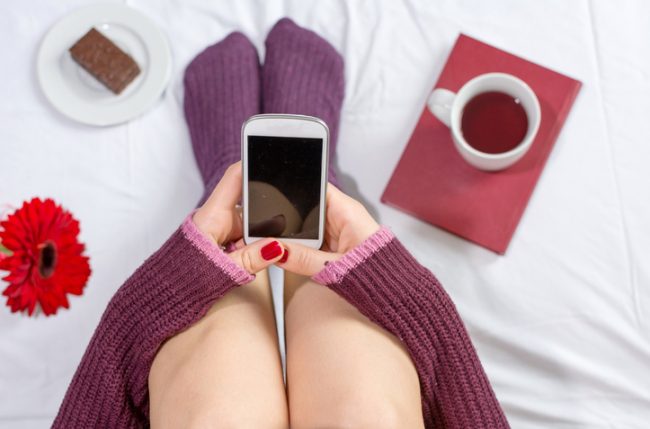We may bemoan our menstrual cycles but our periods are one of the most accurate barometers of our overall health. They grant us insight to our internal health and let us know whether or not our hormones are balanced—which is of utmost importance to complete well-being.
While we may realize how important our periods may be, a number of us don’t bother to track our cycles. Blame busy work schedules, the demands of motherhood, or simple absentmindedness—no matter. But what remains true—and crucial—is that tracking our periods can provide us with a wealth of information about our thoughts, moods, energy and concentration levels, and bodily changes (like the fact that you can’t zip up your pants at certain times of the month).
Fortunately, gone are the days where we had to whip out a calendar the day we started menstruating: Today, we have to do little more than power on our smartphone and download an app.
From the German-made Clue (often considered the gold standard among Ob-gyns) to the ultra-handy Flo (a free app for iPhones), there are dozens of useful apps that can help you stay on top of your cycle. These apps, The New York Times affirms, “transform the input into crunchable data that can tell a woman when her period is due, when it’s late and even why she might be feeling so blue.”
But before you open iTunes—or bust out that credit card—you’ll likely want to know what the pluses of period tracking might be. Here are 5 reasons why you should start tracking your cycle:
1. Fertility
Whether you’re praying for a positive sign on that pregnancy test or using the rhythm method for pregnancy prevention, knowing when you’ll be ovulating is central to gaining control over your fertility—it lets you know when you should be partnering up and, conversely, when you should be celibate.
According to Vogue, Glow is the most valuable for women who hope to get pregnant. “Glow claimed it had helped 20,000 of its users successfully conceive a baby naturally,” the fashion magazine says. “Glow asks users to log in their menstrual cycles but it also asks for daily health information, such as stress levels, basal body temperature, cervical position and smoking and alcohol intake. In the end, Glow not only predicts your fertility peak, but it also provides daily advice tailored to your body.”
2. Vacation planning (and more)
There’s nothing like going on a romantic rendezvous with your partner only to start your period the moment you land at your destination (to say nothing of getting your period on the morning of your wedding). Given that period apps help you predict your cycle—with many sending an alert two days to a week before Aunt Flo’s arrival—you can plan accordingly. And the peace of mind that comes with it? Downright priceless.
3. Sense of community
Sound strange? Think again. We’re entering a new era where women are no longer remaining mum about their menstrual cycles. “Girls and women are openly talking, tweeting and texting about their periods,” The New York Times reports. Additionally, a number of companies are working towards erasing the stigma that surrounds our menses by marketing “P” products, while two high school girls created a video game gleefully called “Tampon Run.”
In other words, having your period isn’t something you must bear alone—and, yes, there’s an app for that. As Glamour Health confirms, women relate “to one another by talking about their periods” while one man, in a video produced by the makers of Clue, said it would be “helpful to know when his partner is most fertile when they’re trying to conceive.” The app, as well as others, lets you share your menstrual calendar with others—and, of course, strategize chocolate sundae-dates with your best friends.
4. Self-care
Period apps are a window into our internal compass, and knowing where you stand in your cycle allows for you to take necessary measures in terms of self-care.
For example, we tend to be more vulnerable right before our periods—with our moods, our confidence, our thoughts, and our ability to take care of things. Knowing when to expect this phase of your cycle will empower you to set time (and energy) aside for self-care and compassion, whether that’s a night alone with your feet propped up and a rom-com on Netflix, or a healing massage to help you manage leg cramps.
Being reminded of which phase you’re in will also allow you to plan in advance for some serious reflection. “Premenstrually, we are quite naturally more in tune with what is most meaningful in our lives,” Dr. Christiane Northrup reports. “We’re more apt to cry—but our tears are always related to something that holds meaning for us. Years of personal and clinical experience have taught me that the painful or uncomfortable issues that arise premenstrually are always real and must be addressed.”
5. A report on your overall health
Your “menstrual cycle rhythms reflect balance in other systems and functions,” Women’s Health Network reminds us. “This is because every month your periods are the result of a coordinated conversation between your brain and your ovaries. Two of the brain regions that direct this conversation—the hypothalamus and pituitary gland—are also intimately connected to the adrenal glands, thyroid, and gut along the same pathways.”
To put it differently, when “one system is disrupted, others may suffer.” A period tracker can help you pinpoint if your period is irregular, absent, or otherwise abnormal, which will help you and your doctor assess if something else is going on with your health—whether that be your adrenal function or your diet (if you’re unwittingly underweight, for example, you may experience amenorrhea – or an absence of your period). What’s more, being able to correctly state the first day of your cycle will assist your physician enormously. We always knew there were hidden health benefits to technology, didn’t we?




